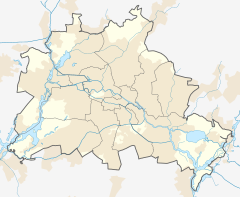Richard-Wagner-Platz (Berlin U-Bahn)
 Platform view of Richard-Wagner-Platz | |||||||||||
| General information | |||||||||||
| Location | Richard-Wagner-Platz, Berlin | ||||||||||
| Coordinates | 52°31′01″N 13°18′24″E / 52.51694°N 13.30667°E | ||||||||||
| Owned by | Berliner Verkehrsbetriebe | ||||||||||
| Operated by | Berliner Verkehrsbetriebe | ||||||||||
| Platforms | 1 island platform | ||||||||||
| Tracks | 2 | ||||||||||
| Train operators | Berliner Verkehrsbetriebe | ||||||||||
| Connections | Template:Bmti M45 N7 | ||||||||||
| Other information | |||||||||||
| Fare zone | VBB: Berlin A/5555[1] | ||||||||||
| History | |||||||||||
| Opened | 14 May 1906 | ||||||||||
| Services | |||||||||||
| |||||||||||
| |||||||||||

Richard-Wagner-Platz is a Berlin U-Bahn station located on the Template:BVG lines in the Charlottenburg district.
History
The original station opened on 14 May 1906 under the name Wilhelmplatz, together with Deutsche Oper the first of several U-Bahn stations designed by Alfred Grenander.[2] At the time it was the western terminus of the first Berlin U-Bahn line (Stammstrecke) after the line's extension from Knie (today Ernst-Reuter-Platz) to the Charlottenburg town hall. However, further extensions in 1908 branched off at Deutsche Oper straight westwards to Reichskanzlerplatz (today Theodor-Heuss-Platz) and the affluent Westend area, so the track to Wilhelmplatz remained a stub. In 1935 the station was renamed after the composer Richard Wagner. It was directly hit on the track area - on Battle of Berlin.
A short-distance train from Deutsche Oper served the station until it was finally closed and demolished in 1970. The new Richard-Wagner-Platz station opened on 28 April 1978 with the extension of the U7 line from Fehrbelliner Platz. It features several Byzantine style mosaics of medieval historic figures, the decoration from a former hotel near Potsdamer Platz that had been demolished in 1975. As the old tunnel has been preserved there is still a direct connection to the Template:BVG lines at Deutsche Oper, used solely for maintenance purposes. The next station is Bismarckstraße (change here for U2)
References
- ^ "Der VBB-Tarif: Aufteilung des Verbundgebietes in Tarifwaben und Tarifbereiche" (PDF). Verkehrsbetrieb Potsdam. Verkehrsverbund Berlin-Brandenburg. 1 January 2017. Retrieved 25 November 2019.
- ^ J. Meyer-Kronthaler, Berlins U-Bahnhöfe, Berlin: be.bra, 1996
External links

